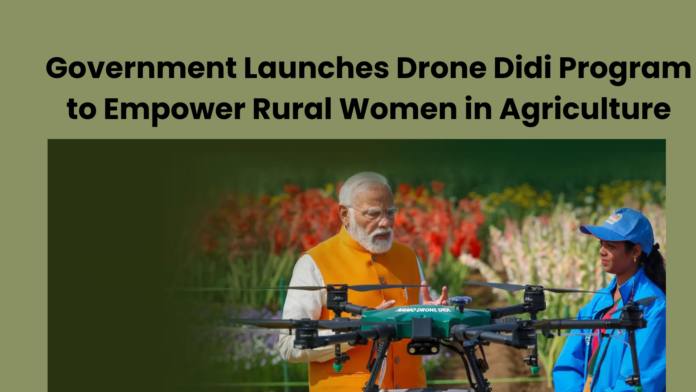In a pioneering move aimed at transforming the agricultural landscape of India, the government has launched the Drone Didi program, a groundbreaking initiative designed to empower rural women by training them to become drone pilots for agricultural purposes. This initiative is part of the broader Sashakt Nari-Viksit Bharat (Empowered Women-Developed India) program.
Aims and Objectives of the Drone Didi Program
The primary aim of the Drone Didi program is to provide rural women with the opportunity to achieve financial independence while modernizing agriculture through the use of drone technology. The program has several key objectives:
- Empowerment of Rural Women: By offering training in drone piloting, the initiative seeks to provide women with new income sources and elevate their social status, challenging traditional gender roles.
- Modernization of Agriculture: The use of drones can significantly enhance agricultural efficiency, enabling precision application of fertilizers and pesticides, monitoring crops, and assessing soil health.
- Sustainable Practices: The program promotes sustainable agriculture by minimizing chemical usage and improving natural resource management through drone data analytics.
- Rural Development: The initiative aims to create new job opportunities and foster community development, helping bridge the digital divide in rural areas.
Implementation by Startup Companies
Startup companies are uniquely positioned to implement the Drone Didi program through various strategies:
- Partnerships with Government: Collaborating with government agencies can help secure contracts for drone services and leverage government resources to expand operations.
- Collaboration with Self-Help Groups (SHGs): Partnering with SHGs allows for localized training and the provision of drones to enhance agricultural services.
- Developing Proprietary Solutions: Startups can create specialized drones or software tailored for agricultural applications, making them indispensable to farmers.
- Building a Network of Drone Pilots: By recruiting and training local drone pilots, startups can establish a platform that connects these pilots with farmers, thereby managing service bookings effectively.
Challenges and Solutions
While the Drone Didi program has immense potential, there are challenges that both drone companies and participants may face:
- Awareness and Adoption: Educating rural women about the benefits of drone technology is crucial for successful implementation.
- Cost Barriers: Initial investments in drones can be prohibitive. Companies can address this by developing affordable solutions and offering financing options.
- Skill Shortage: Ongoing training and partnership with educational institutions can help build a skilled workforce for drone operations.
Comparison with Lakhpati Didi
While both Drone Didi and Lakhpati Didi programs aim to empower women, they focus on different aspects. Lakhpati Didi provides micro-loans and financial literacy training for women to start small businesses, while Drone Didi specifically equips rural women with drone piloting skills.
Positive Impact on Society
The potential impacts of the Drone Didi program are significant. By empowering women and promoting technological adoption in agriculture, the program can lead to:
- Economic Growth: The initiative is expected to foster innovation and contribute to the overall economic development of rural areas.
- Social Development: Both programs can promote gender equality and empower women, leading to enhanced social status and community cohesion.




